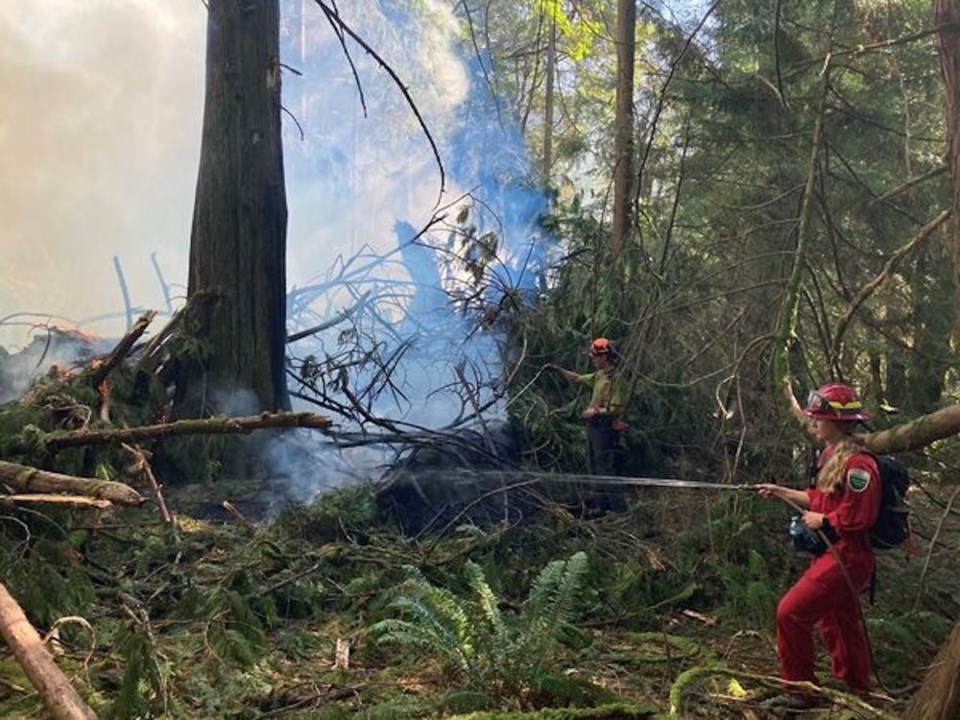Firefighting crews are battling two new wildfires in the Metro Vancouver region as unseasonably warm weather has led to tinder-dry conditions across the southwest coast.
Around 8 a.m. Thursday, Coquitlam Fire and Rescue got word a fire had broken out on Burke Mountain in Coquitlam.
On a BC Hydro right-of-way roughly 500 metres from the Port Coquitlam and District Hunting and Fishing Club, the fire grew to an area spanning 20 by 20 metres.
Coquitlam fire Chief Jim Ogloff said his crews called in helicopter support from the BC Wildfire Service, which dumped buckets of water on the blaze. By noon, firefighters had contained the blaze and were mopping up lingering fires.
“It’s definitely unexpected to see wildfires this late in the year,” said Ogloff. “People need to be extra careful.”
Exercise caution
By 10 a.m. Thursday, the BC Wildfire Service received reports another wildfire had broken out near the shores of Alouette Lake in Golden Ears Provincial Park.
The fire has grown to 0.3 hectares, and Julia Caranci, a fire information officer with BC Wildfire Service’s Coastal Fire Centre, said there are two helicopters and five firefighters working to extinguish it.
And while the shorter days and longer nights have created conditions less likely to produce explosive wildfire growth, Caranci said people still need to exercise caution.
“It still is out of control,” she said.
Streak of fires
The latest wildfires come less than a week after a blaze tore through Metro Vancouver’s Minnekhada Regional Park on the borders of Coquitlam and Port Coquitlam.
As a team of dozens of firefighters and helicopters have fought the blaze in recent days, other wildfires broke out up the Fraser Valley near Chilliwack and Hope.
The combined effect of particulate matter from wildfires in Washington State has led to on going air quality advisories across the Eastern Fraser Valley, Fraser Canyon, as well as the Nicola and Similkameen regions further inland.
Unseasonably warm weather continued across much of British Columbia Thursday, with many parts of the province not reporting significant rain since early July.
On Wednesday, 11 communities set daily maximum temperature records: on the central coast, southern Interior, southeastern B.C. and Vancouver Island, according to Environment Canada.
At 26.9 C, the Pemberton area broke a record that has stood since 1908.
Port Alberni and Vernon, with nearly identical temperatures just above 25 C, surpassed records that have stood for 122 years.
Drought drives concerns over water supply
On the Sunshine Coast, drought has turned so severe the regional district has opened an emergency operations centre.
The district has begun siphoning water from a lake into the region’s water system, one that feeds drinking water to 90 per cent of the region’s residents.
And on Thursday, Metro Vancouver said it is extending its Stage 1 lawn watering regulations in a bid to conserve the region’s drinking water.
The order is in effect until Oct. 31, two weeks longer than normal.
“We need to ensure our current drinking water supply is preserved until the rain returns,” said Sav Dhaliwal, chair of the regional body’s board of directors, in a written statement.
“We are increasingly seeing unexpected weather patterns due to climate change, and we can’t make assumptions about when the rain will start again.”
According to Metro’s Drinking Water Conservation Plan, Stage 1 restrictions mean residents and business have one day a week to water their lawn. What day that is gets determined by property type and address.
If using a sprinkler, trees, shrubs and flowers can be watered in the morning. Restrictions don’t apply to hand watering, drip irrigation, or any kind of watering using recycled sources — like grey or rainwater collectors — outside of the regional and municipal water system. Edible plants are also exempt from the regulations.
Any flouting of the laws may be subject to penalties under local municipal bylaws.
Malcolm Brodie, Richmond mayor and chair of Metro Vancouver's water committee, said reservoir water levels remain within normal ranges. He said the extended restrictions are meant "to provide an extra level of comfort" should the hot, dry weather continue.
“If there were a danger, we would go to Stage 2,” he said. “We wouldn't allow any [lawn] watering at all.”
Stage 1 residential lawn watering allowed
- Even-numbered addresses: Saturdays — automatic watering between 5 a.m. and 7 a.m., and manual watering between 6 a.m. and 9 a.m.
- Odd-numbered addresses: Sundays — automatic watering between 5 a.m. and 7 a.m., and manual watering between 6 a.m. and 9 a.m.
- Trees, shrubs and flowers can be watered with a sprinkler any day between 5 a.m. and 9 a.m., or any time by hand or using drip irrigation.
Stage 1 non-residential lawn watering allowed:
- Even-numbered addresses: Mondays — automatic watering between 4 a.m. and 6 a.m., and manual watering between 6 a.m. and 9 a.m.
- Odd-numbered addresses: Tuesdays — automatic watering between 4 a.m. and 6 a.m., and manual watering between 6 a.m. and 9 a.m.
- Trees, shrubs and flowers can be watered with a sprinkler any day between 4 a.m. and 9 a.m., or any time by hand or using drip irrigation.
With files from the Canadian Press


